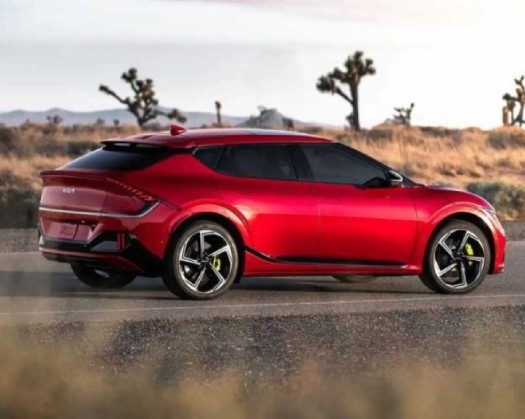Alex Lawrence, a dealer in Salt Lake City specializing in pre-owned electric vehicles, has noticed a shift in his customer base over the last year. Previously, his clientele consisted of affluent professionals willing to spend $70,000 on a Rivian luxury pickup truck.
However, Lawrence has observed a change recently. Customers are now opting for used Teslas priced just above $20,000, taking advantage of a $4,000 federal tax credit. "We're now catering to a younger demographic," Lawrence remarked. "We're seeing more individuals from blue-collar and entry-level white-collar backgrounds. The affordability of these vehicles has significantly increased."
Despite being criticized by conservative politicians and others as symbols of the liberal elite, electric vehicles are becoming more accessible. Prices are decreasing due to heightened competition, reduced raw material expenses, and enhanced manufacturing efficiency. Federal tax credits of up to $7,500 for new EVs, often coupled with state incentives, further drive down costs.
Simultaneously, EV technology is advancing rapidly, making these vehicles more practical. Cars with a range exceeding 300 miles on a single charge are becoming commonplace, while charging times are decreasing to under 30 minutes. The number of fast chargers, capable of replenishing a battery in less than half an hour, surged by 36% from April 2023 to this past April.
Carmakers such as Tesla, Ford, General Motors, and Stellantis, the owner of Jeep, have recently unveiled their plans to introduce electric vehicles (EVs) that will be available for purchase at a starting price of $25,000. This development signifies a significant turning point for the EV market, according to Randy Parker, the CEO of Hyundai Motor America. Hyundai is also joining the EV movement by commencing production of EVs at a factory in Georgia before the year ends. Parker believes that the initial phase of EV adoption, which involved early adopters acquiring their vehicles, has now transitioned into a mass market phase.
This news is not only encouraging for EV proponents but also aligns with the goals of the Biden administration. President Biden aims to have electric vehicles account for half of all new car sales by 2030 as part of his strategy to combat climate change. Even if there is a change in political leadership, with Republicans gaining control of the White House and Congress and potentially dismantling EV subsidies, the market forces driving down prices may prove difficult to reverse.
While major policy changes could potentially impact the pace and scale of EV sales, Peter Slowik, who leads research on passenger cars at the International Council on Clean Transportation, remains optimistic. He believes that the EV market is unlikely to stagnate, as most automakers are committed to an all-electric future and have long-term plans that extend beyond the next administration.
EVs, which have experienced a slowdown in sales recently, still carry a higher price tag compared to gasoline models. In April, the average cost of an EV in the United States was estimated to be $55,252, as reported by Kelley Blue Book. Although this reflects a 9% decrease from April 2023, EVs remain approximately $6,700 more expensive than the average price of all vehicles.
However, Slowik's group predicts that by 2030, cars and SUVs capable of traveling 400 miles on a full battery will be cheaper than their internal combustion engine counterparts, even without factoring in government subsidies. It is worth noting that pickup trucks, which require larger batteries, will take a bit longer to reach price parity for 400-mile models, expected to achieve it by 2033.
These calculations do not consider the cost advantages of lower fuel and maintenance expenses associated with EVs. Electricity tends to be cheaper per mile compared to gasoline, and EVs eliminate the need for oil changes, engine air filters, and spark plugs. For individuals who frequently drive long distances, EVs may already offer a more financially favorable option. Additionally, some automakers are providing significant discounts on EV models to attract buyers.
While prices for EVs are on a downward trend, there are potential risks to consider. China currently supplies over half of the lithium-ion batteries used in cars sold in the United States, as highlighted by research firm Interact Analysis. The recent announcement by the Biden administration to increase tariffs on these batteries from 7.5% to 25% in May will likely result in higher costs for these essential components.
Many companies are constructing battery factories in the United States and Canada, however, most of these facilities will not be able to match China's battery production capacity for several years.
Raw materials pose another potential risk. The prices of lithium and other essential battery materials have dropped significantly over the past year, resulting in more affordable electric vehicles. Nevertheless, commodity prices could rise once again.
The recent deceleration in EV sales growth has led companies like Tesla and Ford to postpone their manufacturing expansion plans. Despite this, many analysts anticipate an increase in sales due to a surplus of models driving prices down and the expansion of charging infrastructure. Surveys indicate that high prices and concerns about finding charging stations are the top reasons why people hesitate to purchase an EV.
For many individuals, the cost of the vehicle is not the sole consideration. Those living in apartments often rely on public charging stations, which are not only less convenient but also more expensive compared to home charging.
Nonetheless, the factors contributing to lower prices are formidable. Manufacturing expenses are decreasing as traditional automakers, previously slow to adopt EVs, leverage their extensive mass production experience to the new technology.
Later this year, General Motors is set to introduce an electric version of its Chevrolet Equinox SUV, which will boast an impressive range of over 300 miles and will be priced below $30,000 after the $7,500 federal tax credit. Additionally, the company has plans to launch an even more affordable electric vehicle, the Chevrolet Bolt, next year.
Both the Equinox and Bolt will be constructed using GM's Ultium platform, a versatile collection of components that can be utilized across various vehicle types, including luxury Cadillacs and pickups. By leveraging the same batteries and parts for different models, GM has successfully reduced costs and expects its electric vehicles to become profitable in the latter half of this year.
According to Prateek Biswas, an analyst at Wood Mackenzie, a research firm, electric vehicles still incur approximately 10% higher manufacturing costs compared to internal combustion engine cars. However, Biswas predicts that these costs will decrease as companies refine their production processes, such as eliminating rare minerals from electric motors or substituting copper wiring with aluminum.
Simultaneously, the expenses associated with manufacturing gasoline cars are rising due to more stringent emissions regulations. Biswas suggests that eventually, transitioning towards electric vehicles will become a more viable and straightforward option.
Competition is increasing as Toyota and other Japanese automakers, known for their reliable and affordable vehicles, are now entering the EV market. Honda is also planning to produce EVs at an Ohio factory starting next year.
There will be over 100 fully electric models available for purchase in the United States by next year, doubling the number from last year, as reported by Cars.com. This increase in options makes EVs more accessible to a wider range of consumers.
The used-car market plays a significant role in the adoption of EVs, as most people opt for used vehicles. The availability of used EVs from manufacturers like Tesla, Nissan, and GM, which have been on the market for several years, provides more affordable options. In fact, more than half of the used EVs on the market are priced below $30,000, according to Recurrent, a research firm specializing in the used EV market.
Jesse Lore, the proprietor of Green Wave Electric Vehicles in North Hampton, New Hampshire, recently completed the sale of a pre-owned Chevy Bolt for $15,000. With the inclusion of a federal tax credit specifically for used electric vehicles, the final price was reduced to $11,000. In addition to the enticing affordability, Lore emphasized that his customers appreciate the quieter nature of electric vehicles compared to their gasoline counterparts, their positive impact on the environment, and their superior speed due to the instantaneous torque generated by electric motors.
According to Lore, "The car provides a more enjoyable experience than whatever they are currently driving."













